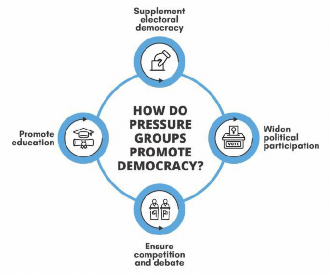Supplement electoral democracy
Pluralists often highlight the advantages of group representation over representation through elections and political parties. Pressure groups may either supplement electoral democracy (making up for its defects and limitations) or they may replace political parties as the main way in which people express their views and interests:

♤ Pressure groups keep government in touch with public opinion in-between elections. One of the weaknesses of elections is that they only take place every few years. By contrast, pressure groups force the government to engage in an ongoing dialogue with the people, in which the interests or views of the various sections of society cannot be ignored.
o IAC’s anti-corruption movement was one such example where the pressure groups made the government
aware of rising sentiment in general public against corruption in public life.
♤ Pressure groups give a political voice to minority groups and articulate concerns that are overlooked by political parties. Elections, at best, determine the general direction of government policy, with parties being anxious to develop policies that appeal to the mass of voters. Pressure groups are therefore often more effective in articulating concerns about issues such as the environment, civil liberties, global poverty, violence against women and the plight of the elderly.
o Women’s organizations such as SEWA, NCW have campaigned for women-friendly laws such as the Protection of Women from Domestic Violence Act, 2005.
o In the North-Eastern State of Manipur, many groups including ‘Just Peace’, Apunba Lup (students’ organization) and Meira Paibis (women’s groups) are trying to influence the government to listen to people’s genuine grievances. Together, these groups are associated with Irom Sharmila, a civil rights activist known as ‘the Iron Lady of Manipur’ who has been on a hunger strike since November 2000.
